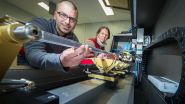Ice sheet collapse triggered ancient sea level peak: ANU media release
An international team of scientists has found a dramatic ice sheet collapse at the end of the ice age before last caused widespread climate changes and led to a peak in the sea level well above its present height
2015-06-10
(Press-News.org) An international team of scientists has found a dramatic ice sheet collapse at the end of the ice age before last caused widespread climate changes and led to a peak in the sea level well above its present height.
The team found the events 135,000 years ago caused the planet to warm in a different way to the end of the most recent ice age about 20,000 to 10,000 years ago.
The findings will help scientists understand the processes that control Earth's dramatic climate changes, said the leader of the study, Dr Gianluca Marino of The Australian National University (ANU).
"We knew the sea level had overshot its present levels during the last interglacial period, but did not know why. Now we for the first time can explain the processes that caused the sea levels to exceed the present levels," said Dr Marino, from the ANU Research School of Earth Sciences.
"Ice-age cycles may superficially look similar to one another, but there are important differences in the relationships between melting of continental ice sheets and global climate changes."
The team, which includes researchers from ANU as well as the Universities of Southampton and Swansea in the UK, has published their findings in Nature.
At the end of an ice age the continental ice sheets, ocean, and atmosphere change rapidly. Scientists have previously only been able to reconstruct in detail the changes at the end of the last ice age.
"We have compared the fluctuations at the end of an earlier ice age, and we found that the patterns were different," said co-author Professor Eelco Rohling, from both ANU and the University of Southampton.
"At the end of the older ice age, 135,000 years ago, we found that a dramatic collapse of the Northern Hemisphere ice sheets into the North Atlantic Ocean suppressed the ocean circulation and caused cooling in the North Atlantic."
"North Atlantic cooling was counterbalanced by Southern Ocean warming that then destabilised Antarctic land ice, causing a continuation of melting that eventually drove sea level rise to several meters above the present," he said.
This is very different from the end of the last ice age, said Dr Marino.
"The northern hemisphere ice-sheet collapse and climate change did not occur at the same time, and that caused much less warming in Antarctica," he said.
The team used precisely-dated cave records and marine sediments from the Mediterranean region to reconstruct the sequence of changes in all critical climate parameters.
INFORMATION:
ELSE PRESS RELEASES FROM THIS DATE:
2015-06-10
Several neurodegenerative disorders are caused by aggregates of a single protein known as alpha-synuclein. In collaboration with CNRS and the University of Antwerp, KU Leuven neurobiologists have discovered that the shape of these aggregates - 'cylinders' or 'ribbons' - determines whether a patient develops Parkinson's disease or Multiple System Atrophy, respectively.
Typical of neurodegenerative disorders is the disrupted communication between brain cells together with a loss of cells in specific brain regions. For some brain diseases this phenomenon is linked to a ...
2015-06-10
The discovery of how a group of bacteria rapidly adapts to changing growth conditions could have implications for future antibiotic development, according to research at the University of Oxford and the University of York.
Led by Professor Colin Kleanthous at Oxford and Dr Christoph Baumann at York, the research which also involved key collaborators Mark Sansom at Oxford and Jacob Piehler at the University of Osnabrück, is published in Nature.
Gram-negative bacteria are a major cause of disease, in part because they have a robust outer membrane that protects ...
2015-06-10
A University of Manchester led trial of a new psoriasis drug has resulted in 40 percent of people showing a complete clearance of psoriatic plaques after 12 weeks of treatment and over 90 percent showing improvement.
The research tested 2,500 people with psoriasis. Half were given a new drug - ixekizumab - either once every two or four weeks. The other half were given a placebo or a widely used drug for psoriasis called etanercept.
The ixekizumab groups showed quick and extensive improvements in their condition, outperforming the groups on placebo or etanercept. Around ...
2015-06-10
wo NASA satellites provided a look inside and outside of Tropical Cyclone Ashobaa. NASA and JAXA's GPM satellite observed rainfall rates and cloud heights identifying powerful thunderstorms within the cyclone, and NASA's Aqua satellite provided an overall look at Ashobaa's cloud extent.
The Global Precipitation Measurement (GPM) core observatory had an excellent view of Tropical Cyclone Ashobaa in the Arabian Sea over on June 8, 2015 at 2131 UTC (5:31 p.m. EDT). As expected, Tropical Cyclone Ashobaa was more powerful than when seen by GPM earlier in the day. GPM's Microwave ...
2015-06-10
Genetically modified fish that overexpress growth hormone have been created for more than 25 years, but unlike many domesticated crops, transgenic fish have yet to enter commercial production. Because of the difficulty inherent in eradicating an established fish population, efforts are under way to model the threat posed by possible invasions.
In an article for an upcoming issue of BioScience, a team of government and academic researchers, led by Robert Devlin of Fisheries and Oceans Canada, examined the possible outcomes of an accidental release of transgenic fish. Their ...
2015-06-10
The air around us is a chaotic superhighway of molecules whizzing through space and constantly colliding with each other at speeds of hundreds of miles per hour. Such erratic molecular behavior is normal at ambient temperatures.
But scientists have long suspected that if temperatures were to plunge to near absolute zero, molecules would come to a screeching halt, ceasing their individual chaotic motion and behaving as one collective body. This more orderly molecular behavior would begin to form very strange, exotic states of matter -- states that have never been observed ...
2015-06-10
Most galaxies are clumped together in groups or clusters. A neighboring galaxy is never far away. But this galaxy, known as NGC 6503, has found itself in a lonely position, at the edge of a strangely empty patch of space called the Local Void.
The Local Void is a huge stretch of space that is at least 150 million light-years across. It seems completely empty of stars or galaxies. The galaxy's odd location on the edge of this never-land led stargazer Stephen James O'Meara to dub it the "Lost-In-Space galaxy" in his 2007 book, Hidden Treasures.
NGC 6503 is 18 million ...
2015-06-10
New research from UBC and the Child & Family Research Institute at BC Children's Hospital shows that risky outdoor play is not only good for children's health but also encourages creativity, social skills and resilience.
The findings, published in the International Journal of Environmental Research and Public Health, found that children who participated in physical activity such as climbing and jumping, rough and tumble play and exploring alone, displayed greater physical and social health.
"We found that play environments where children could take risks promoted increased ...
2015-06-10
Google searches for information on melanoma and skin cancer increased over the summer months during a five-year period, although the level of interest did not correlate with the melanoma mortality to incidence ratio, suggesting that increased search volumes may not be associated with early detection, according to a research letter published online by JAMA Dermatology.
Researcher Kyle T. Amber, M.D., of MacNeal Hospital, Berwyn, Ill., and coauthors used Google Trends, a research tool which quantifies interest in topics at the population level by analyzing all search queries ...
2015-06-10
For years, research on nuclear weapons has relied on old data, limited experiments and computer modeling. But this year, that pattern has changed. Scientists have run new experiments that simulate what happens to plutonium in a nuclear explosion, according to an article in Chemical & Engineering News (C&EN), the weekly newsmagazine of the American Chemical Society. The research will deepen scientists' understanding of the element -- and help them analyze a nuclear event should one occur.
In the article, Jyllian Kemsley, a senior editor at C&EN, notes that six years ago, ...
LAST 30 PRESS RELEASES:
[Press-News.org] Ice sheet collapse triggered ancient sea level peak: ANU media release
An international team of scientists has found a dramatic ice sheet collapse at the end of the ice age before last caused widespread climate changes and led to a peak in the sea level well above its present height




